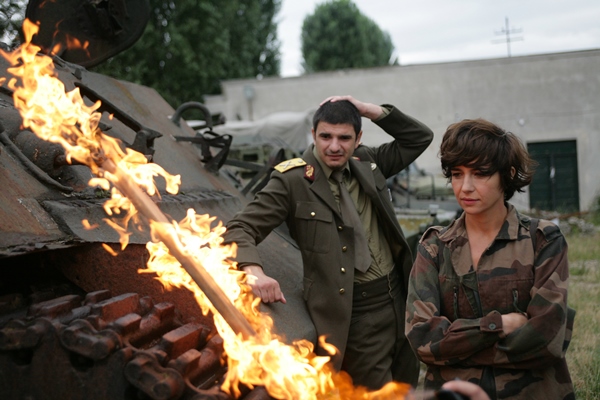![]() Radu Jude’s 2015 film Aferim! laid a cold hand on the heart with its offhanded portrayal of racist cruelty in feudal Romania. Now Jude’s back with I Do Not Care If We Go Down in History as Barbarians, a cockeyed, brilliant, and surreal comedy about that most rib-tickling of subjects, Holocaust denial. Apparently this phenomenon is thriving in contemporary Romanian life and thought.
Radu Jude’s 2015 film Aferim! laid a cold hand on the heart with its offhanded portrayal of racist cruelty in feudal Romania. Now Jude’s back with I Do Not Care If We Go Down in History as Barbarians, a cockeyed, brilliant, and surreal comedy about that most rib-tickling of subjects, Holocaust denial. Apparently this phenomenon is thriving in contemporary Romanian life and thought.
And, oh, what a lot of thought there is to share. This hyper-meta play-within-a-film namechecks Walter Benjamin and features a heroine who reads Isaac Babel out loud in her underpants and Hannah Arendt after having sex. Some of the myriad intellectual references may not resonate with the casual viewer, and the film abounds in inside jokes about Romanian society, but the gist of Jude’s views on the matter should be clear.
Mariana Marin (Ioana Iacob, radiating intelligence and wearing her beauty lightly) is in the process of researching and eventually directing a theater piece about Marshal Ion Antonescu, leader of Romania’s conveniently forgotten and soft-pedaled alliance with Hitler during World War II. Mariana doesn’t like what she sees. Antonescu exceeded Nazi expectations for killing Jews, and his arrogant response defending the massacres forms the movie’s title. But no one around Mariana seems to care about the country’s sordid role in one of history’s great crimes. That includes her married boyfriend, who helpfully volunteers that he’s tired of “Jewish whining” and chalks up the murders as just another case of Romania imitating Western Europe.
Mariana’s efforts to stage her project with a ragtag crew afford Jude some moments of delightful absurdity and kooky satire—the movie could use more of them. Shambolic auditions and unruly crowd scenes reveal the limitations of the non-professional actors in her cast. Mouthy extras (all male and all dumb as rotting mulch) challenge Mariana’s view of history. Throughout many scenes, Romania reveals a hoary self-image through fusty museums displays, pompous oompah bands, and the heroic poses of an actor playing Antonescu in a 1990s movie that presents the old killer as a national treasure. The budding director weathers these annoyances, but Mariana has yet to meet her greatest challenge.
Her sponsor at the cultural institute, Mr. Movila (Alexandru Dabija), arrives on the set, and he’s heard she’s stirring up trouble. Here Jude treats us to a dizzying argument between director and patron enacted in long wide shots, with Movila gleefully playing the role of a Mephistopheles bent on undermining not just the project but its raison d’être. Couldn’t Mariana stage a show about Communist crimes instead? The crucifixion? The Roman conquest of the Dacians? Isn’t Mariana inflating the death toll? Won’t her show upset the children? Who does Mariana think she is, Leni Riefenstahl? A manipulative master of whataboutery, Movila forces Mariana on the defensive. She parries and stands her ground. Like the liberals on Fox News, she’s forced by a hostile questioner into a demeaning role as a whiner, a spoilsport, and a virtue signaler. We feel her weariness.
Attended by Bucharest’s inane deputy mayor, Mariana’s big show unfolds with a switch in Barbarians’s format, from 16mm film to digital video, a barrage of explosions, and one casualty. Not since “Springtime for Hitler” in Mel Brooks’s The Producers (1968) has a filmmaker mounted such a willfully weird Holocaust set piece. Some unexpected reactions from the crowd unnerve Mariana, but she should not be surprised. Humanity’s ugliness always lurks among us, Jude implies, in his trademark matter-of-fact way. In a nation so consumed with denials, it can be hard to say who has the last laugh—an eerie closing note to a film so vibrant and smart.







Leave A Comment